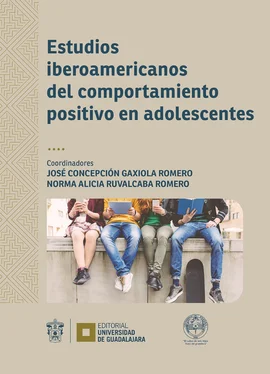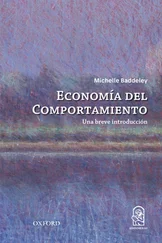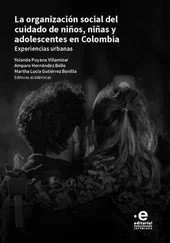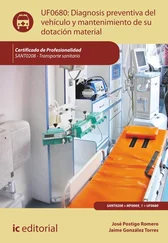González-Villalobos, J. Á. y Josefa, M. R. (2017). Determinantes sociodemográficos y personales del bienestar subjetivo y psicológico en población mexicana. 24 (1), 59-66.
Gutiérrez, M. y Gonçalves, T. O. (2013). Activos para el desarrollo, ajuste escolar y bienestar subjetivo de los adolescentes. International Journal of Psychology and Psychological Therapy, 13 (3), 339-355.
Hair, J. F., Black, W. C., Babin, B. J. y Anderson, R. E. (2014). Multivariate Data Analysis: Pearson New International Edition, 7/E. Nueva Jersey: Pearson.
Henao, G. C., Ramírez, C. y Ramírez, L. A. (2007). Las prácticas educativas familiares como facilitadoras del proceso de desarrollo en el niño y la niña, 7 (2), 233-240.
Hendrie, N. K. (2015). Cohesion familiar, adaptabilidad y su incidencia en la resiliencia de adolescentes (grado de Maestría en Relaciones Familiares). Universidad de Montemorelos, México.
Jackson, D. L. (2003). Revisiting Sample Size and Number of Parameter Estimates: Some Support for the N:q Hypothesis. Structural Equation Modeling: A Multidisciplinary Journal, 10 (1), 128-141.
Kaneez, S. (2015). Family environment and psychological well-being among adolescents. Indian Journal of Positive Psychology, 6 (3), 306-308.
Kashdan, T. B. y Rottenberg, J. (2010). Psychological flexibility as a fundamental aspect of health. Clinical Psychology Review, 30 (7), 865-878. https://doi.org/10.1016/j.cpr.2010.03.001.
Kassis, W., Artz, S. y White, J. (2017). Understanding Depression in Adolescents: A Dynamic Psychosocial Web of Risk and Protective Factors. Child & Youth Care Forum, 46 (5), 721-743.
Kotliarenco, M. A., Cáceres, I. y Fontecilla, M. (1997). Estado del arte en resiliencia. Organización Panamericana de la Salud. Recuperado de https://books.google.com.mx/books?id=j58NGwAACAAJ.
Leiva, L., Pineda, M. y Encina, Y. (2013). Autoestima y apoyo social como predictores de la resiliencia en un grupo de adolescentes en vulnerabilidad social. Revista de Psicología, 22 (2), 111-123.
Li, B., Ma, H., Guo, Y., Xu, F., Yu, F. y Zhou, Z. (2014). Positive psychological capital: A new approach to social support and subjective well-being. Social Behavior and Personality: an international journal, 42 (1), 135-144.
Lyubomirsky, S. (2001). Why are some people happier than others? The role of cognitive and motivational processes in well-being., 56 (3), 239-249.
Markland, D. (2007). The golden rule is that there are no golden rules: A commentary on Paul Barrett’s recommendations for reporting model fit in structural equation modelling. Personality and Individual Differences, 42 (5), 851-858.
Medellín Fontes, M. M., Rivera Heredia, M. E., López Peñaloza, J., Kanán Cedeño, M. G. y Rodríguez-Orozco, A. R. (2012). Funcionamiento familiar y su relación con las redes de apoyo social en una muestra de Morelia, México. Salud mental, 35, 147-154.
Moore, K. A. y Ramírez, N. A. (2016). Adverse Childhood Experience and Adolescent Well-being: Do Protective Factors Matter? Child Indicators Research, 9 (2), 299-316.
Moreno, Y. y Marrero, R. J. (2015). Optimismo y autoestima como predictores de bienestar personal: diferencias de género. Revista Mexicana de Psicología, 32 (1), 27-36.
Moyer, D. N. y Sandoz, E. K. (2015). The Role of Psychological Flexibility in the Relationship Between Parent and Adolescent Distress. Journal of Child and Family Studies, 24 (5), 1406-1418.
Navarro, D., Montserrat, C., Malo, S., González, M., Casas, F. y Crous, G. (2017). Subjective well-being: what do adolescents say? Child & Family Social Work, 22 (1), 175-184.
Patil, A. P. y Adsul, R. K. (2017). A Correlational Study on Resilience and Well-Being among College Adolescents in Kolhapur City. Indian Journal of Positive Psychology, 8 (1).
Patton, G. C., Sawyer, S. M., Santelli, J. S., Ross, D. A., Afifi, R., Allen, N. B. y Viner, R. M. (2016). Our future: a Lancet commission on adolescent health and wellbeing. The Lancet, 387 (10036), 2423-2478.
Rivera-Heredia, M. E. y Andrade Palos, P. (2010). Escala de evaluación de las Relaciones Intrafamiliares (E.R.I.). Uaricha Revista de Psicología, 14, 12-29.
Rodríguez-Fernández, A., Ramos-Díaz, E., Ros, I., Fernández-Zabala, A. y Revuelta, L. (2016). Bienestar subjetivo en la adolescencia: el papel de la resiliencia, el autoconcepto y el apoyo social percibido. Suma Psicológica, 23 (2016), 60-69.
Ruiz, M. A., Pardo, A. y Martín, R. S. (2010). Modelos de ecuaciones estructurales. Papeles del Psicólogo, 31 (1), 34-45.
Rutter, M. (1985). Resilience in the face of adversity: protective factors and resistance to psychiatric disorder. British Journal of Psychiatry. 147, 598-611.
Ryff, C. D. (2016). Articolo Target. Psychological well-being and health: Past, present and future. Psicologia della salute, 1, 7-26.
Ryff, C. D. (1989). Happiness Is Everything, or Is It? Explorations on the Meaning of Psychological Well-Being. Journal of Personality and Social Psychology, 57, 1069-1081.
Ryff, D., y Keyes, L. M. (1995). The structure of psychological well-being revisited. Journal of Personality and Social Psychology, 69 (4), 719-727.
Sanjuán, P. y Ávila, M. (2016). Afrontamiento y motivación como predictores del bienestar subjetivo y psicológico, 21 (1), 1-10.
Schütte, S., Chastang, J. F., Parent-Thirion, A., Vermeylen, G. y Niedhammer, I. (2014). Social Inequalities in Psychological Well-Being: A European Comparison. Community Mental Health Journal, 50 (8), 987-990.
Siennick, S. E., Widdowson, A. O., Woessner, M. K., Feinberg, M. E. y Spoth, R. L. (2017). Risk Factors for Substance Misuse and Adolescents’ Symptoms of Depression. Journal of Adolescent Health, 60 (1), 50-56.
Skevington, S. M., Lotfy, M. y O’Connell, K. A. (2004). The World Health Organization’s WHOQOL-BREF quality of life assessment: Psychometric properties and results of the international field trial. A Report from the WHOQOL Group. Quality of Life Research, 13, 299-310.
Soper, D. (2018). A-priori Sample Size Calculator for Structural Equation Models. Recuperado de www.danielsoper.com/statcalc.
Souza, C., De Alexandre, M. C. y Guirardello, E. de B. (2017). Propriedades psicométricas na avaliação de instrumentos: avaliação da confiabilidade e da validade. Epidemiologia e Serviços de Saúde, 26, 649-659.
Sruthy, R. y Naachimuthu, K. P. (2017). Family relationship and general well-being of adolescents and young adults. Indian Journal of Health & Wellbeing, 8 (7), 674-679.
Torres Cruz, M. L. y Ruiz Badillo, A. (2013). Habilidades de resiliencia en estudiantes de educación media superior del Estado de México. En J. C. Gaxiola Romero y J. Palomar Lever (eds.). Estudios de resiliencia en América Latina, volumen 2 (pp. 53-69). México: Pearson Education.
Vargas Halabí, T. y Mora-Esquivel, R. (2017). Tamaño de la muestra en modelos de ecuaciones estructurales con constructos latentes: Un método práctico. Actualidades Investigativas en Educación, 17, 25-60.
Verdugo-Lucero, J. C., Ponce de León-Pagaza, B. G., Guardado-Llamas, R. E., Meda-Lara, R. M., Uribe-Alvarado, J. I. y Guzmán-Muñiz, J. (2013). Estilos de afrontamiento al estres y bienestar subjetivo en adolescentes y jóvenes. Revista Latinoamericana de Ciencias Sociales, Ninez y Juventud, 11 (1), 79-91.
Vescovelli, F., Albieri, E. y Ruini, C. (2014). Self-rated and observer-rated measures of well-being and distress in adolescence: an exploratory study. Springerplus, 3.
Villalobos, A. (2009). Desarrollo de una medida de resiliencia para establecer el perfil psicosocial de los adolescentes resilientes que permita poner a prueba el modelo explicativo de resiliencia basado en variables psicosociales. San José: Universidad de Costa Rica.
Vinaccia, S., Quiceno, J. M. y Moreno San Pedro, E. (2007). Resiliencia en adolescentes. Revista Colombiana de Psicología, (16), 139-146.
Читать дальше












